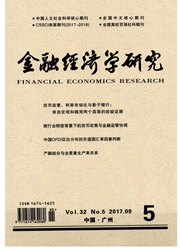

 中文摘要:
中文摘要:
以Almeida et al.and Bao et al.的模型为基础,并借鉴了国内学者的做法,以中国2003~2011年A股上市公司为样本,运用中国人民银行分季度定期公布"货币政策的定期表述"及分季度"货币政策相关指数",研究了货币政策、外部融资约束和现金—现金流敏感性之间的内在联系。研究发现,当央行货币政策趋于紧缩时,外部融资约束加剧,企业利用现金流积累现金的倾向会趋于稳健,现金—现金流敏感性随之发生变化;当央行放宽货币政策,融资约束下降,企业运用现金流积累现金的倾向会趋于降低;在货币政策趋于宽松时,对于融资约束企业,其现金—现金流敏感性显著下降,而对于非融资约束企业,其对降低企业现金—现金流敏感性所产生的效应不明显。
 英文摘要:
英文摘要:
On the ground of the models of Almeida et al. and Bao et al. , this paper, based on the data 2003-2011 gathered from A-share listed companies,studies the relation- ship among monetary policy, external financing constraints and the cash -cash flow sensitivi- ty using" Monetary Policy Index and monetary policy periodically expressed" which released by the People Bank of China. The paper finds that corporate cash -cash flow sensitivity var- ied with changes of monetary policy atmosphere. As the administration takes a relaxed mone- tary policy, it inclines to loose corporate financing constraints and weaken the cash -cash flow sensitivity. But this effect mainly is applied to financial constraint corporations. It im- plies that the cash-cash flow sensitivity of financial constraints corporations diminished sig- nificantly during the period of monetary policy loosing, while it doesn' t diminish significant- ly for non-financial constraint corporations while the administrative takes the loosing mone- tary policy. This study provides a reasonable theoretical explanation and revelation of how monetary policy affects the external financing constraints, and then acting on the cash flow of the micro - enterprise, this study not only enriches the theory of monetary policy, explain the theoretical confusion why the cash flow of the micro -enterprise is more sensitive to macro monetary policy adjustments, but also provides an important policy implication of how coun- tries use monetary policy to control micro-economic foundation.
 同期刊论文项目
同期刊论文项目
 同项目期刊论文
同项目期刊论文
 期刊信息
期刊信息
